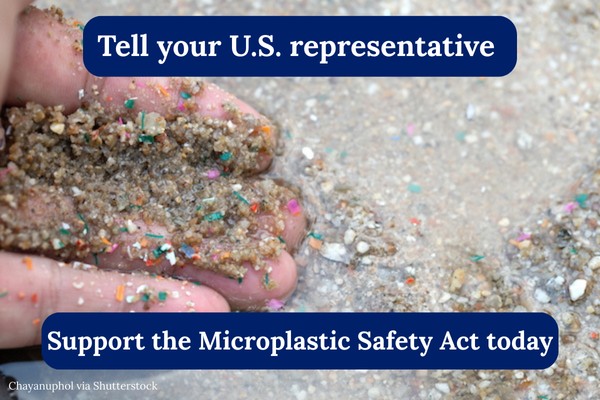
John,
If Americans are absorbing tens of thousands of particles every year, we need to know the impact they could have.1
Microplastics have been found in our water, food and even our brains.2 Researchers are now beginning to discover the range of detrimental effects microplastics may have on our health.
That's why we're urging Congress to pass the Microplastics Safety Act, which would require the Food and Drug Administration (FDA) to study the health impacts of microplastic exposure.3
Tell your U.S. House representative to support the Microplastic Safety Act today.
Microplastics are extremely small pieces of plastic -- some too little to even be seen -- that form when plastic breaks down. These particles can also shed off of plastic packaging, bottle caps and containers and into food and drink, even during normal use.4
Once released into the environment, these near-invisible particles can enter our food, water, soil and, eventually, our bodies. Recently, research has detected microplastics in our blood, lungs, livers, placentas and even brain tissue.5
While the science is still emerging, researchers suspect microplastics could have serious implications for our health, with links ranging from chronic inflammation to heart disease and even dementia.6,7
Given these alarming findings, we should have a comprehensive federal study on the human impacts of microplastics on our health, before even more of these particles can end up in our food, water and air.
Tell your U.S. House representative to support the Microplastics Safety Act today.
This bill would direct the FDA to investigate how microplastic exposure impacts our health, including how these particles influence childhood development and hormone regulation.8
We shouldn't wait until the damage is irreversible to take this seriously, especially when the health of our kids could be at risk. A clearer scientific understanding of the impacts of microplastics will help us better convince decision-makers to take the action needed to protect our health and environment.
While this bill isn't the final answer to the microplastic problem, it's a vital first step toward creating a foundation for further research and building a case for more action in the future.
The evidence we do have is troubling. The potential risks are even more urgent.
Thank you for speaking up,
Faye Park
President
1. "Americans Consume Tens of Thousands of Microplastic Particles Every Year," Yale Environment 360, June 5, 2019.
2. Sandee LaMotte, "Microplastics shed by food packaging are contaminating our food and drink, study finds," CNN Health, June 24, 2025.
3. "Bynum Introduces Legislation to Examine the Impacts of Microplastics," Congresswoman Janelle Bynum, July 17, 2025.
4. Grace Vickers, "Studies show how microplastics from packaging get into our food," PIRG, July 21, 2025.
5. Sandee LaMotte, "Microplastics shed by food packaging are contaminating our food and drink, study finds," CNN Health, June 24, 2025.
6. Grace Vickers, "Studies show how microplastics from packaging get into our food," PIRG, July 21, 2025.
7. Micheal Haederle, "UNM Researchers Find Alarmingly High Levels of Microplastics in Human Brains -- and Concentrations are Growing Over Time," UNH Health Sciences, February 28, 2025.
8. "Bynum Introduces Legislation to Examine the Impacts of Microplastics," Congresswoman Janelle Bynum, July 17, 2025.
Support U.S. PIRG. Contributions by people just like you make our advocacy possible. Your contribution supports a staff of organizers, attorneys, scientists and other professionals who monitor government and corporate decisions and advocate on the public's behalf.
Join us on Facebook | Follow us on Twitter
U.S. PIRG, Main Office: 1543 Wazee St., Suite 460, Denver, CO 80202, (303) 801-0582
Federal Advocacy Office: 600 Pennsylvania Ave. SE, 4th Fl., Washington, DC 20003, (202) 546-9707
Member Questions or Requests: 1-800-838-6554.

If you want us to stop sending you email then follow this link -- unsubscribe.
